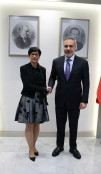Small town, big change: Lüleburgaz pedals towards a greener future with e-bike taxis

At the heart of this free service is a fleet of five pedal-powered electric tricycle taxis. The fleet carries some of the city’s most vulnerable residents, including elderly people, people with disabilities, pregnant women and young children accompanied by parents, safely across town.
The tricycle taxi is not only easing daily life but also helping Lüleburgaz pedal its way toward a more sustainable future.
Speaking with pride, Deputy Mayor Gökhan Kaya Atay says: “This bike taxi changed Lüleburgaz,” he adds: “We started in 2017 as part of our project to fight climate change with bicycles.”
EUROPEAN UNION, 2025
Deputy Mayor of Lüleburgaz Gökhan Kaya Atay
The project, formally known as “We’re Fighting Climate Change with Our Bicycles”, was launched under the EU’s Instrument for Pre-Accession Assistance (IPA).
A local solution to a global crisis
“Our city is growing fast. With population rise comes more carbon emissions,” Atay explains. They needed a local, accessible solution, and bikes play a key role in reducing the carbon footprint.
The city rolled out the programme with three bike taxis funded by the EU, later adding two more through municipal resources. The aim? To reduce reliance on motor vehicles, cut emissions, and promote an inclusive model of urban mobility.
“We now operate four of them daily, keeping one in reserve in case of breakdowns,” Atay adds. “It’s completely free, and residents just call us.”
A service embraced by all
EUROPEAN UNION, 2025
Retired Osman Gülgör
Osman Gülgör, a retired shopkeeper, is a frequent user of the service. “You just call, and they come right to your door,” he says, smiling. “This is a blessing for people like me who are over 65 or struggle with mobility.”
EUROPEAN UNION, 2025
Retired Semra Peksezen
Retired Semra Peksezen agrees. She uses the service so that she doesn’t have to carry heavy shopping bags when she goes shopping.
“At first I was nervous, but now I love it,” she says. “It’s free and comfortable. For people on a pension like me, it saves a lot.”
EUROPEAN UNION, 2025
Gizem and Aren Kurt
The sentiment is echoed across town. Gizem Kurt, a young mother, says her son Aren looks forward to every ride.
“He loves it,” she laughs. For Aren, it’s like an adventure. “Especially when it’s rainy or cold, this bike taxi is a lifeline.”
The human touch beyond the pedals
Egemen Göksu, a trained electric-bike taxi driver, is one of the people pushing the pedals of this quiet transport revolution.
EUROPEAN UNION, 2025
Driver Egemen Göksu and his colleague
“We pick people up from their homes and take them wherever they need to go,” explains Göksu. “Our passengers feel safe with us.”
Each driver undergoes training in safety, customer care and technical handling. The bike taxis are electrically assisted, but pedalling is still required, which keeps the system eco-friendly. Seatbelts are standard.
They are part drivers, part listeners. “We talk and laugh with our passengers. It’s more than just a job; it’s about forming connections,” says Göksu.
EUROPEAN UNION, 2025
Bike taxis carry 10,000 passengers every year
A ripple effect
The results speak for themselves. The bike taxis carry 10,000 passengers every year. Since 2017, the number of people using bicycles in Lüleburgaz has increased by 80%. Where there used to be just two bike shops, there are now eight. The city now hosts an annual cycling festival and organises tours to nearby villages.
“People see these taxis on the street, and they are impressed. They want to ride a bike,” says Atay. “It’s changed how the city feels about cycling.”
A model worth pedalling after
Although the project has officially ended, its impact endures. The initiative successfully introduced a new form of transport, mapped carbon emissions, trained 160 citizens in bike safety and embedded cycling in the city’s culture.
“We’re not done yet,” concludes Atay. “We’re still working on research and development to improve the design, expand the fleet, and spread the concept.”
The EU’s aspect
The Acting Head of the Delegation of the European Union to Türkiye, Jurgis Vilčinskas, says:
“This project is a powerful example of how EU-Türkiye cooperation can deliver real and local solutions to a global challenge. By supporting communities that are serious about taking climate action, we’re investing in healthier, greener futures for all.”
EUROPEAN UNION, 2025
The Acting Head of the Delegation of the European Union to Türkiye, Jurgis Vilčinskas
The project, the beneficiary of which was the Ministry of Environment and Urbanisation, was funded by the “Capacity Development in the Field of Climate Change in Türkiye” grant programme under the IPA.
What is IPA?
The Instrument for Pre-Accession Assistance (IPA) is the means by which the EU has been supporting reforms in the enlargement region with financial and technical assistance since 2007. IPA funds build up the capacities of the beneficiaries throughout the accession process, resulting in progressive, positive developments in the enlargement region to which Türkiye belongs.





